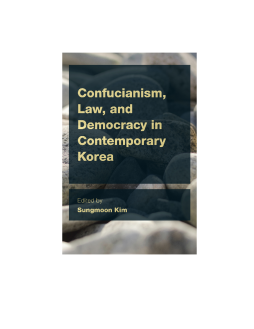
Additional Information
Book Details
Abstract
Comparative political theory has grown into a recognized discipline in its own right in the last two decades. Yet little has been done to explore how political theory engages with the actual social, legal, and political reality of a particular polity. East Asians are complexly conditioned by traditional Confucian norms and habits, despite significant social, economic, and political changes in their contemporary lives. This volume seeks to address this important issue by developing a specifically Confucian political and legal theory.
The volume focuses on South Korea, whose traditional society was and remains the most Confucianized among pre-modern East Asian countries. It offers an interesting case for thinking about Confucian democracy and constitutionalism because its liberal-democratic institutions are compatible with and profoundly influenced by the Confucian habit of the heart. The book wrestles with the practical meaning of liberal rights under the Korean Confucian societal culture and illuminates a way in which traditional Confucianism can be transformed through legal and political processes into a new Confucianism relevant to democratic practices in contemporary Korea.
This theoretically sophisticated volume marks a significant advance in our understanding of the interplay between Confucian and constitutional discourses. The contributions are both focused and varied, with a richness that befits the traditions under examination, and demonstrate the power of theorizing from East Asia.
Tom Ginsburg, Leo Spitz Professor of International Law, Ludwig and Hilde Wolf Research Scholar and Professor of Political Science, The Univeristy of Chicago
Sungmoon Kim is Associate Professor of Political Theory at City University of Hong Kong. He is the author of Confucian Democracy in East Asia: Theory and Practice (2014).
Contributors
Fred Dallmayr, Packey J Dee Professor Emeritus of Philosophy and Political Science, University of Notre Dame; Chaihark Hahm, Professor of Law, Yonsei University; Hwa Yol Jung, Emeritus Professor of Political Science, Moravian College; Bi Hwan Kim, Professor of Political Theory, Sungkyunkwan University; Hee-Kang Kim, Associate Professor of the Department of Public Administration, Korea University; Marie Seong-Hak Kim, Professor of History, St. Cloud State University; Sungmoon Kim, Associate Professor of Political Theory, City University of Hong Kong; Junghoon Lee, Associate Professor of Jurisprudence and Legal History, University of Ulsan.
This ground breaking volume addresses one of the most important questions of our time: what is—or might be—the contemporary relevance of Confucianism? Rich, learned, and impressive, the essays it contains greatly expand our understanding of the promise and the pitfalls of contemporary applications of this ancient philosophy.
Rahul Sagar, Yale NUS College
